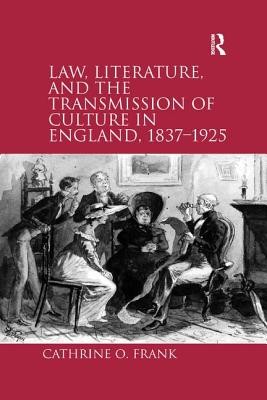
- We will send in 10–14 business days.
- Author: Cathrine O Frank
- Publisher: Routledge
- ISBN-10: 113826055X
- ISBN-13: 9781138260559
- Format: 15.6 x 23.4 x 1.4 cm, softcover
- Language: English
- SAVE -10% with code: EXTRA
Law, Literature, and the Transmission of Culture in England, 1837-1925 (e-book) (used book) | bookbook.eu
Reviews
Description
Focusing on the last will and testament as a legal, literary, and cultural document, Cathrine O. Frank examines fiction of the Victorian and Edwardian eras alongside actual wills, legal manuals relating to their creation, case law regarding their administration, and contemporary accounts of curious wills in periodicals. Her study begins with the Wills Act of 1837 and poses two basic questions: What picture of Victorian culture and personal subjectivity emerges from competing legal and literary narratives about the will, and how does the shift from realist to modernist representations of the will accentuate a growing divergence between law and literature? Frank's examination of works by Emily Brontë, George Eliot, Charles Dickens, Wilkie Collins, Anthony Trollope, Samuel Butler, Arnold Bennett, John Galsworthy, and E.M. Forster reveals the shared rhetorical and cultural significance of the will in law and literature while also highlighting the competition between these discourses to structure a social order that emphasized self-determinism yet viewed individuals in relationship to the broader community. Her study contributes to our knowledge of the cultural significance of Victorian wills and creates intellectual bridges between the Victorian and Edwardian periods that will interest scholars from a variety of disciplines who are concerned with the laws, literature, and history of the nineteenth and early twentieth centuries.
EXTRA 10 % discount with code: EXTRA
The promotion ends in 21d.00:25:34
The discount code is valid when purchasing from 10 €. Discounts do not stack.
- Author: Cathrine O Frank
- Publisher: Routledge
- ISBN-10: 113826055X
- ISBN-13: 9781138260559
- Format: 15.6 x 23.4 x 1.4 cm, softcover
- Language: English English
Focusing on the last will and testament as a legal, literary, and cultural document, Cathrine O. Frank examines fiction of the Victorian and Edwardian eras alongside actual wills, legal manuals relating to their creation, case law regarding their administration, and contemporary accounts of curious wills in periodicals. Her study begins with the Wills Act of 1837 and poses two basic questions: What picture of Victorian culture and personal subjectivity emerges from competing legal and literary narratives about the will, and how does the shift from realist to modernist representations of the will accentuate a growing divergence between law and literature? Frank's examination of works by Emily Brontë, George Eliot, Charles Dickens, Wilkie Collins, Anthony Trollope, Samuel Butler, Arnold Bennett, John Galsworthy, and E.M. Forster reveals the shared rhetorical and cultural significance of the will in law and literature while also highlighting the competition between these discourses to structure a social order that emphasized self-determinism yet viewed individuals in relationship to the broader community. Her study contributes to our knowledge of the cultural significance of Victorian wills and creates intellectual bridges between the Victorian and Edwardian periods that will interest scholars from a variety of disciplines who are concerned with the laws, literature, and history of the nineteenth and early twentieth centuries.


Reviews